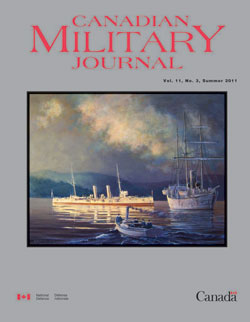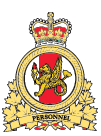Valour (Vol. 11, No. 4)
 This information has been archived for reference or research purposes.
This information has been archived for reference or research purposes.
Archived Content
Information identified as archived on the Web is for reference, research or recordkeeping purposes. It has not been altered or updated after the date of archiving. Web pages that are archived on the Web are not subject to the Government of Canada Web Standards. As per the Communications Policy of the Government of Canada, you can request alternate formats on the "Contact Us" page.
Valour (Vol. 11, No. 4)

LETTERS TO THE EDITOR
Padre (Major ret’d) Art Gans, CD, MTh
13363 Carr’s Landing Road
Winfield, BC, V4V 1A2
For more information on accessing this file, please visit our help page.
I could not pass up the opportunity to comment on Michel Reid’s article in the Summer issue of CMJ. I could not agree with him more when he says that an “ethical disobedience clause” is a needed addition to both the Queen’s Regulations and Orders (QR & Os), and to the Laws of Armed Conflict.
One of the reasons that the Canadian military is held in high respect in this world is that we have not only trained our personnel in military skills, but we have also trained them in a standard of military professional ethics and ethical decision making. And we expect our members to exercise these skills as well as their military skills, not only when it is easy to do, but when it is difficult.
I do not know what I would have done in the position of Captain Semrau in Afghanistan. But I agree with Lieutenant-Colonel Reid that neither a simplistic appeal to military law, nor an almost equally simplistic appeal to some ethical system would result in an easy direction. As someone who made at least one very costly ethical decision while a serving officer in the United States Army Reserve, I think it is fair to say that when questions arise that touch our ethical core, they are never easy or simple.
The proposal to have an “ethical disobedience clause” would, I believe, provide a strengthening of both our military law and our military professional ethics. I would not foresee it being used with great regularity, but the simple fact of its existence would mean that both our legal system and our professional ethics systems would recognize the importance of the concept of “conscience.”
Some of the dialogue concerning neurobiology and neuropsychology which have recently come to my attention suggest that we may indeed be “hard wired” for some form of empathy, and that the lack of that, which does occur in some people, is an almost certain diagnosis of a severe psychosis. I would suggest that actions which might fall under such an “ethical disobedience clause” would be those in which the individual’s conscience or hard-wired empathy came into conflict with either the military law, or his or her military professional ethics. Such a conflict would not be common, but such a defence would, in my opinion, be a proper response when such a situation did arise. And for those of an historical bent, it would fulfil the opinion of the Nurnberg Tribunals that said conscience could and should require one to disobey an order.
Sincerely,
Padre Art Gans
DND Photo IS2011-1027-04[1]






